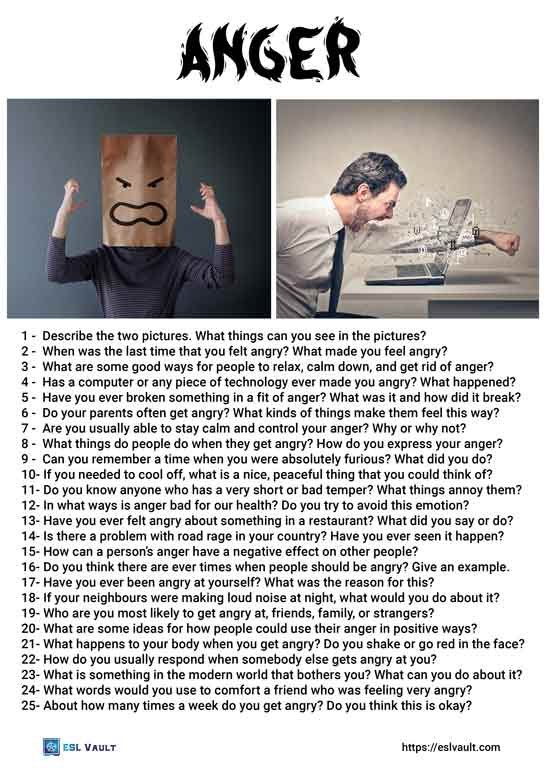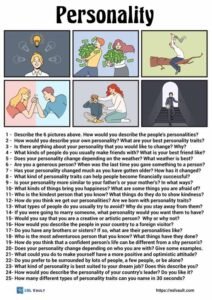Anger conversation questions
Anger is a strong emotion that we all feel from time to time. People get this feeling in sorts of situations and react to it in different ways. You can use these anger conversation questions to get a good discussion or debate going in your ESL classes.
Note that this topic is only suitable for older teenagers and adults. It is also quite difficult and best for upper-intermediate level learners and above.
The most challenging terms in this speaking activity that you may need to go over before starting the discussion include – get rid of, technology, fit of anger, express, control, furious, absolutely, short/bad temper, road rage, positive, negative, respond, and bother.

The anger conversation questions are –
When was the last time that you felt angry? What made you feel angry?
What are some good ways for people to relax, calm down, and get rid of anger?
Has a computer or any piece of technology ever made you angry? What happened?
Have you ever broken something in a fit of anger? What was it and how did it break?
Do your parents often get angry? What kinds of things make them feel this way?
Are you usually able to stay calm and control your anger? Why or why not?
What things do people do when they get angry? How do you express your anger?
Can you remember a time when you were absolutely furious? What did you do?
If you needed to cool off, what is a nice, peaceful thing that you could think of?
Do you know anyone who has a very short or bad temper? What things annoy them?
In what ways is anger bad for our health? Do you try to avoid this emotion?
Have you ever felt angry about something in a restaurant? What did you say or do?
Is there a problem with road rage in your country? Have you ever seen it happen?
How can a person’s anger have a negative effect on other people?
Do you think there are ever times when people should be angry? Give an example.
Have you ever been angry at yourself? What was the reason for this?
If your neighbours were making loud noise at night, what would you do about it?
Who are you most likely to get angry at, friends, family, or strangers?
What are some ideas for how people could use their anger in positive ways?
What happens to your body when you get angry? Do you shake or go red in the face?
How do you usually respond when somebody else gets angry at you?
What is something in the modern world that bothers you? What can you do about it?
What words would you use to comfort a friend who was feeling very angry?
About how many times a week do you get angry? Do you think this is okay?
If you enjoyed this discussion topic, similar topics that you may enjoy include the stress conversation questions or the happiness conversation questions.

Different ways to say get angry in English
The English language has a lot of interesting expressions to describe the act of getting angry. Here are a few that you can introduce to your class once they have finished discussing the anger conversation questions. See if your students can create grammatically correct sentences using these expressions.
- To fly off the handle
- To get bent out of shape
- To throw a fit
- To lose your cool
- To blow your top
- To hit the roof
- To blow a fuse
- To see red
- To get cheesed off




